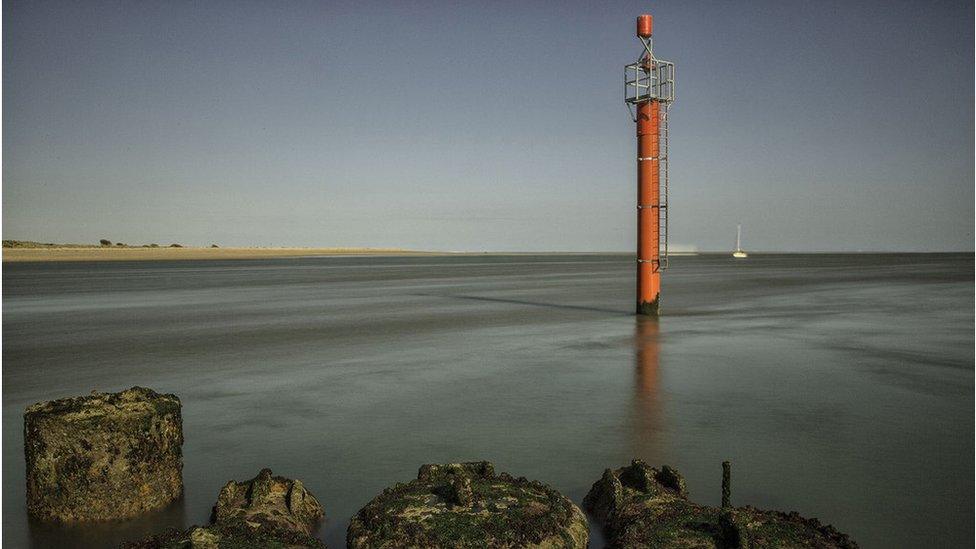Aquind: Government loses bid to block cross-Channel electricity cable
- Published

The Stop Aquind campaign, pictured here in Portsmouth in 2021, is "disappointed" by the ruling
The UK government's decision to refuse permission for a £1.2bn electricity link between England and France has been overturned in the High Court.
Aquind Ltd wants to lay cables through Portsmouth, Hampshire, to Normandy.
Last year's decision to block the scheme was made by then Business Secretary Kwasi Kwarteng.
Aquind challenged the decision in the High Court after being granted a judicial review.
In a statement, the government said it was "disappointed by the outcome but we will be considering the judgment carefully before deciding next steps".
The project is now expected to be referred back to Mr Kwarteng's successor as Business Secretary, Grant Shapps, to make a final decision.
Aquind's proposal has faced objections from residents, campaigners and local MPs, including Commons leader and Portsmouth North MP Penny Mordaunt.
Ms Mordaunt said: "The plan will never happen. It is hard to imagine why any investor would want to be associated with it.
"I believe the government's decision was the right one and that it will stand."
The Stop Aquind campaign group argue the cable could cause damage to "onshore and shoreline wildlife", threatening the habitats of birds and insects.
The campaigners also express concern about "pollution resulting from the construction traffic".
In his January 2022 ruling, Mr Kwarteng said he was not satisfied that "more appropriate alternatives to the proposed route" for the interconnector cable had been fully considered.
But lawyers for Aquind argued in the High Court that Mr Kwarteng had "misunderstood the evidence" when making his decision.

The interconnector, allowing electricity to flow between the two countries, will make landfall at Eastney beach in Portsmouth
Aquind director Richard Glasspool said Mrs Justice Lieven's decision to rule against the business secretary and Portsmouth City Council was "wonderful news" for the interconnector project.
"We look forward to re-engaging with local residents, stakeholders, environmental experts, and energy professionals in order to pursue the commitment to meeting the UK's net zero energy target," he added.
But Portsmouth South MP Stephen Morgan said the court's decision "will be a bitter blow to Portsmouth people".
"Aquind's desperate attempt to re-run the argument through the High Court doesn't change the facts, and it shouldn't change the outcome," he said.
"I've been clear from the outset that this project would bring untold disruption to our daily lives and our city's natural environment, with no clear benefits."
The MP added he would "continue to do everything in my power to ensure this project is stopped once and for all".
'Raise awareness'
Paula-Ann Savage, of the Stop Aquind campaign group, said she was "disappointed" with the court's decision.
But she added: "We will continue to raise awareness of the dangers to the environment and our national security.
"Aquind are not an appropriate company to carry out any energy infrastructure project in the UK."

Aquind Ltd is led by Ukrainian-born British businessman Alexander Temerko
In October 2021, the BBC's Panorama programme revealed that Aquind is part-owned by Russian-born former oil executive Victor Fedotov.
The company has donated more than £700,000 to 34 Conservative MPs since the Aquind project began.
Aquind's co-owner, Ukrainian-born businessman Alexander Temerko, has donated a further £700,000 to the party.
- Published21 June 2022

- Published13 July 2021
